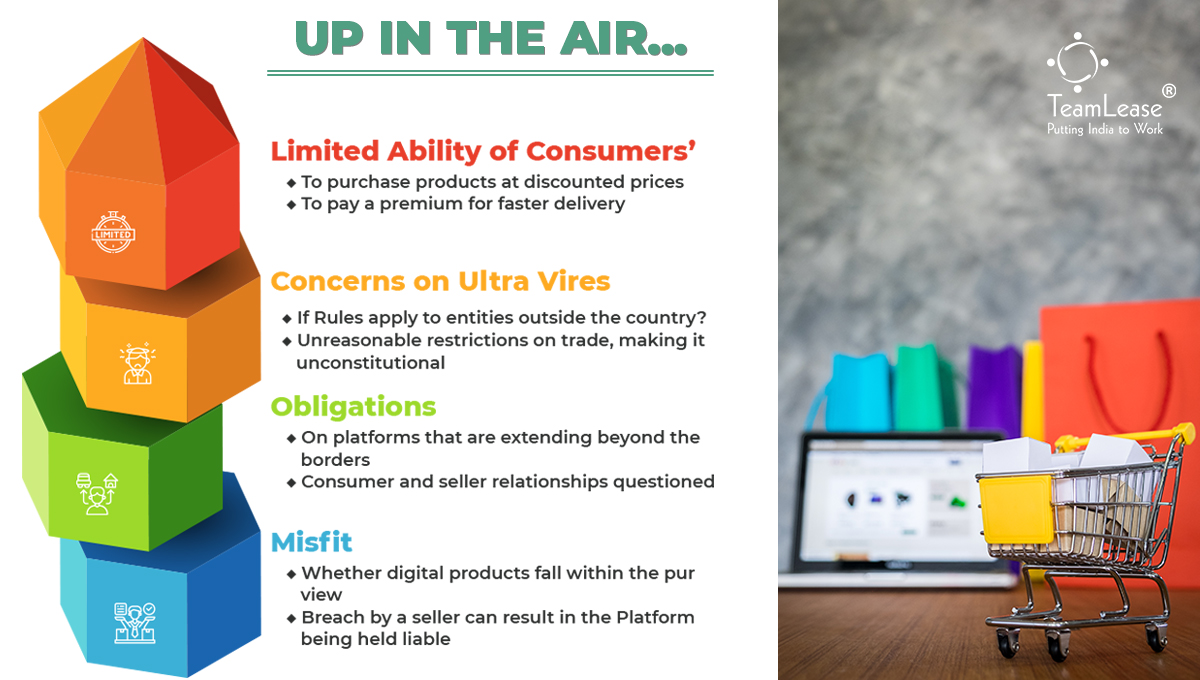13 Reasons Why: New E-commerce Rules Haunt Businesses

The new e-commerce rules had a greater and direct impact on the businesses. Those there were welcoming aspects, there have been certain aspects that cannot be ignored. Looking at the flip side of the coin, gives one a specific idea on the peculiarities of these new rules.
Concerns Still Linger
Any breach of these Rules will have to satisfy the condition of being an “unfair practice” before they are held liable. Several questions are still unanswered in these new rules, like –
1: At the functional level, is the implementation and application of the rules possible to the fullest extent?
2: Silence on the assessment licensed by an entity based in another country. (Assessment of goods assembled, packaged or manufactured in one country)
3: The kinds of digital product offerings fall within its purview?
4: If a breach by a seller can also result in the Platform being held liable?
5: If the new rules of the act are beyond the legal power or authority (ultra vires)?
6: Complicated because these rules are applied to entities outside of the country.
7: The rules’ obligations are imposed on platforms that are extending beyond the borders between consumer and seller relationships?
Up in the air…
Key Issues with New E-commerce Rules

At a deeper level:
8: Lack of Definition: Lack of uniform definition of e-commerce, since buying/selling goods online are generally considered as e-commerce/internet commerce, even though the final delivery is largely offline.
9: Ease of Doing Business: The restrictions include a gamut of compliances, which, by increasing the regulatory burden, can reduce the ease of doing business for startups on online platforms.
10: Entry Barrier: Free trade practices that enabled startups to easily enter the e-commerce trade arena would cease to exist.
11: Burden on Sellers: The burden will eventually trickle down to the sellers, affecting the top line.
12: Agreement Rejig: Any company that currently has a common beneficial ownership agreement or is associated with an e-commerce company will not be allowed to be listed as a seller on that platform and might have to shift. This could result in building a whole consumer base from scratch involving costs and/or losses
13: Increased liabilities: For online e-tailers for all trade carried out on their platforms.
Business Impact and Probable Outcome
Although these New Rules are a welcome step in ensuring the welfare and protection of the interests of consumers using the various e-commerce platforms, these new rules will also put significant limitations on the consumers’ ability to purchase products at discounted prices and pay a premium for faster delivery.
For the platforms, the dawn appears gloomy as businesses have a host of things to comply with as per the rules laid out. There are thus multiple pointers that the businesses are worried about.
On the Lookout
As mentioned, the new rules have a flip side of the coin to look out for, and these are quite haunting. Unless the concerns are answered, it is difficult to migrate everyone onto a new ecosystem without turbulence.
However, we must welcome these changes as the rules and not as the ruler. With a positive growth outlook for the E-commerce industry, it’s necessary to take stock of the drivers of growth, as they are the implicit rulers of the industry. These new rules are a stepping stone for the regulatory norms surrounding this industry to bridge the gap between brick-and-click marketplace models.
Latest Blogs
Permanent vs. Contract Staffing: What’s Right for Your Business?
Workforce strategy matters now more than ever in India’s evolving employment landscape. As businesses strive for growth, efficiency, and regulatory compliance, choosing between permanent staffing...
Read MoreApprenticeship Programs vs Internship: Understanding the Difference
As India sharpens its focus on employability, workforce formalization, and industry-aligned skilling, the conversation around apprenticeship programs vs. internship has become increasingly important. For employers,...
Read MoreApprenticeship India: A Guide to NAPS, NATS & Compliance
As India strengthens its workforce strategy, apprenticeship initiatives in India are gaining renewed relevance for employers across sectors. With skill gaps widening and compliance requirements...
Read MoreHow Apprenticeships in India Help Build Job-Ready Talent?
In a fast-evolving job market, businesses across India face a common challenge: finding candidates who are not just qualified on paper but ready to perform...
Read MoreStrategic Workforce Planning in India: Why Smart Talent Strategy is Important?
For years, strategic workforce planning in India was treated as a back-office exercise—something to be revisited when hiring pressure built up or attrition spiked. That...
Read More





